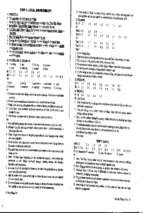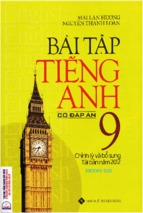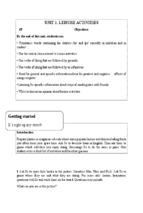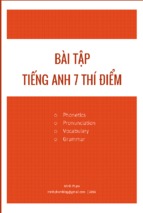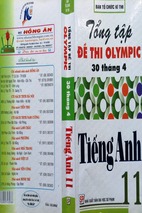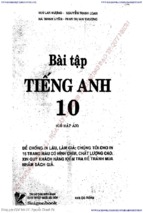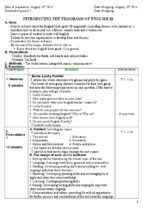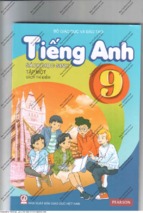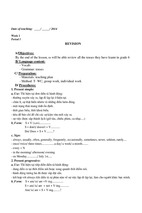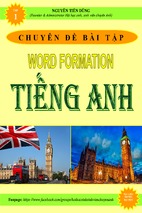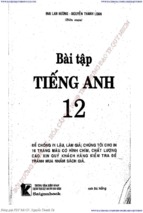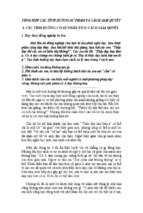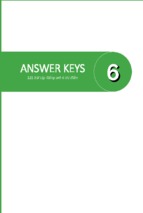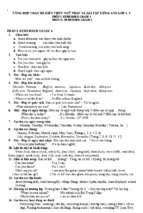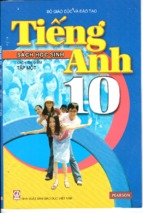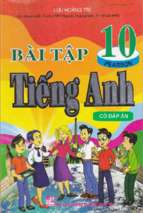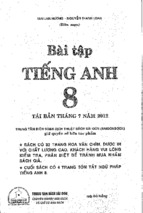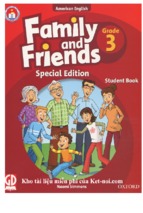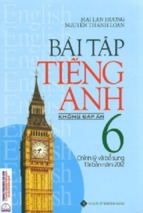UNIT 1: LEISURE ACTIVITIES
I.Vocabulary:
Word
Addicted(a)
/ə’diktid/
Meaning
Nghiện (thích
cái gì)
Adore(v)
/ə’d :r/
Yêu thích, mê
thích
Jane adores working with
children
Trung tâm văn
hóa cộng đồng
The locals go to the
community centre every
weekend
Community
centre
/kəˈmjuːnəti
‘sentər/
Picture
Examples
Many teenagers are
addicted to computer
games nowadays
Craft(n)
/kra:ft/
Đồ thủ công
He invited me to a craft
work
shop lastweek
DIY
/di: ai wai/
Đồ tự làm, tự
sửa
My brother is a real DIY
enthusiast
Hang out
/hæŋ aut/
Đi chơi với bạn
bè
I often hang out with
friends in my freetime
Leisure (n)
/ˈleʒə(r)/
Giải trí
These days we have more
leisure activities than in the
past
Mind(v) /maind/ Chú ý, để ý
I hope you don’t mind the
noise
Rely on
/ri’lai on/
Tin tưởng, tin
cậy
You can rely on his
judgement
Savings(n)
/seivi ŋ z/
Tiền tiết kiệm
He spent all his saving on
buying a new car
Socialise(v)
/’s əuʃəlaɪz/
Giao tiếp để
tạo mối quan
hệ
He enjoys socialising with
other students
Stranger(n) /
ˈstreɪndʒə(r)/
Người lạ
You shouldn’t reveal your
personal information to
strangers
Surf(v) /sɜːf/
Lướt
I spent two hours a day
surfing the web
Trick(n) /trik/
Mẹo
He amazed everyone by a
card trick
Virtual(a) /
ˈvɜːtʃuəl/
ảo (chỉ có ở
trên mạng)
The Internet has created a
virtual world for its users
III. Grammar: CÁC ĐỘNG TỪ DIỄN ĐẠT SỰ YÊU THÍCH (VERBS OF LIKING)
1. VERBS OF LIKING:
Động từ
Nghĩa
Adore
Yêu thích, mê mẩn
Love
Yêu
Like/ enjoy/ fancy
Thích
Don’t mind
Không phiền
Dislike/ don’t like
Không thích
Hate
Ghét
Detest
Căm ghét
2.VERBS OF LIKING + V_ING / TO V:
-Khi muốn dùng một động từ chỉ một hàng động khác ở sau động từ chỉ sự thích, ta phải
sử dụng danh động từ (V_ing) hoặc động từ nguyên thể co “to” (toV)
1.Verbs + V-ing/ to V
Những động từ đi với cả danh động từ và động từ nguyên thể có “to” mà không đổi về
nghĩa
Verbs
Verbs + V-ing
Verbs +to V
Like
I like skateboarding in my free time
I like to skateboard in my free time
Love
She loves training her dog
She loves to train her dog
Hate
He hates eating out
He hates to eat out
Prefer My mother prefers going jogging
My mother prefers to go jogging
2. Verbs + V-ing
Những động từ chỉ đi với danh động từ
Verbs
Verbs + V-ing
Adore
They adore eating ice-cream
Enjoy
We enjoy playing basketball
Fancy
Do you fancy making crafts?
Don’t mind
I don’t mind cooking
Dislike
Does he dislike swimming?
Detest
I detest doing housework
BÀI TẬP VẬN DỤNG CƠ BẢN:
Bài 1: Hoàn thành những câu sau, sử dụng dạng nguyên thể có (to)(toV) của động từ
trong ngoặc:
1.Everyone likes (eat)_________ice cream.
2.Do you prefer (read)books in your freetime?
3.I hate(watch)________horror movies?
4.Many people prefer(go)______travelling on holidays.
5.My father loves(play)__________golf with his friends.
6.I prefer (not stay)__________up too late.
7. What does your sister love(do)_________in her spare time?
8.I used to prefer(hang out)_________with my friends at weekend.
9. I think not many people like(listen)________to her music.
10. Teenagers love (surf)_________the web to while away their freetime.
Bài 2: Hoàn thành những câu sau, sử dụng dạng danh động từ (V-ing) của động từ
trong ngoặc:
1.My mother dislikes(prepare)_______the meals.
2.Do you enjoy(do)________DIY in your freetime?
3. I detest (have) __________a conversation with John.
4.Do you think Jane prefers(not socialise)___________with other students?
5.I don’t mind(explain)_______the problem again.
6.Ann fancies(listen)___________to songs of her favourite singer.
7.My friend adores(spend)_______time with her cats.
8.I always love(try)________new things when I go travelling.
9.Mr.Smith hates(drive)_________his old car.
10.Anne prefers(not go)_________out too late.
Bài 3:Điền dạng thích hợp của động từ trong ngoặc để hoàn thành các câu sau:
1.Did you enjoy(watch)______the comedy last night?
2.Many people prefer(do)______gardening after their retirement.
3.My cat dislikes(sleep)________on the floor.
4.My father doesn’t mind(work)______hard.
5.My cousin doesn’t like(study)_________Math and Chemistry.
6.They dislike(talk)__________with each other.
7.Jim and Jane don’t fancy(go)__________out tomorrow.
8.Did you hate(eat)______vegetables when you was small?
9.she didn’t prefer(tell)________him about her plan.
10.James enjoys(have)_______dinner in a luxury restaurant.
11.I hope my mother will enjoy(spend)_______time with her grandchildren.
12.Some people enjoy(take)______a shower in the morning.
13.I think your brother won’t mind(lend)________you a helping hand.
14.My boyfriend dislike(wait)____________.
15.What do you detest(do)__________the most?
Bài 4: Dựa vào các từ cho sẵn, viết thành câu hoàn chỉnh:
1.Peter/ prefer/ play/ computer games/ in his free time.
2.You/ hate/ do/ the washing?
3.My father/ enjoy/ play/ sports/ and/ read/ books.
4.The teacher/ not mind/ help/ you/ with difficult exercises.
5.Jane/ not fancy/ read/ science books.
6.Which kind of juice/ you/ dislike/ drink/ the most?
7. Ann/ fancy/ do /DIY/ in her free time.
8. My father/ prefer/ not eat/ out.
9.Mr.Smith/ love/ go/ shopping/ at weekend.
10.Everyone/ adore/ receive/ presents/ on their birthday.
BÀI TẬP VẬN DỤNG NÂNG CAO
Bài 5: Đánh dấu(V) trước câu đúng, đánh dấu(X) trước câu sai và sửa lại cho đúng:
1.My sister doesn’t mind to look after my cat.
2.Jim dislikes going to the library because he likes reading books.
3.I prefer to not go out today.
4.I used to like watching cartoons on TV.
5.Does Mrs.Smith enjoy to cook?
6.Mary hates doing the housework and take after her baby sister.
7. In my freetime, I love to do DIY with my sister.
8.Josh detests to socialise with his co-workers.
9.Which movie does he fancy to watch?
10.I prefer hanging out with friends to playing computer games.
Bài 6: Điền dạng đúng của các động từ chcho sẵn vào chỗ trống sao cho hợp lý:
socialize
detest
surf
write
rely
read
adore
Hang out
1.My brother likes__________the Internet looking for new music.
2.I dislike_________too much on other people. I want to be independent.
3.Josh enjoys__________with his classmates after school.
4.My sister and I fancy_______novels when we have free time.
5.He’s very artitic. He enjoys________poems in his free time.
6.James_________talking with his neighbors because he finds them annoying.
7.My uncles loves__________with other people . he has many friends.
8.Ann__________working with children. She’s a teacher.
Bài 7: Khoanh tròn vào đáp án đúng:
Nowadays, leisure activities are totally different from the past. Many people no longer
enjoy(1) in outdoor activities after school. In stead, they(2)playing computer games or (3)
the web in their free time. Some people (4)too much on computer and the Internet. For
example, they prefer(5) messages to having a face-to-face conversation with friends. Even
when people (6)out with their friends, they rarely talk but they use their phones to surf web.
However, many people dislike the Internet and the(7)world. They hate to waste time on the
computer and(8)other activities such as reading, shopping or sporting.
1.A.participate
B.to participate
C. participating
D. participates
2.A.fancy
B.don’t mind
C.dislike
D.hate
3.A.sailing
B. surfing
C.swimming
D.diving
4.A.play
B.rely
C.addict
D.use
5.A.send
B.to send
C.to sending
D. sends
6.A.play
B.rely
C.meet
D.hang
7.A.virtual
B.real
C.fake
D.new
8.A.dislike
B.detest
C.enjoy
D.mind
Bài 8: Đọc doạn văn sau và điền (T-true)trước câu đúng với nội dung bài đọc , điền
(F-false) trước câu không đúng với nội dung bài đọc:
LEISURE ACTIVITIES IN BRITAIN
The weekends area a time for many leisure activities in Britain. British people often have to
work five days a week from Monday to Friday is the precious time for family and friends.
People enjoy various indoor and outdoor activities in Britain. According to the EU’s
statistical office, British people spend abot 45% of their free time watching television, 24%
of their free time socialising , 22-23% on sport and hobbies, and 10% on other activities.
Other popular leisure activities are listening to the radio, listening to pre-recorded music,
reading, DIY, garedning, eating out and going to the cinema.
The most common leisure activity in the UK is watching television. The average viewing
time is 25 hours per person per week. Almost all households have at least one television
set. The second most popular activity in Britain is visiting or entertaining friends or relations.
Another popular leisure activity is gardening. The British are known as a nation of
gardeners. Most people have a garden on their property. Every town in Britain has one or
more DIY centers and garden centres. These are like supermarkets for the home and
garden. These places are very popular with British home-owners at the weekends.
_______1.People enjoy various indoor activities Britain.
_______2.British people spend more than half of their free time watching television.
_______3.The most common leisure activity in the UK is visiting or entertaining friends or
relations.
_______4. All house holds have at least one television set.
_______5.British people are all gardeners.
_______6. All towns in Britain have one or more DIY centers and garden centres.
UNIT 2: LIFE IN THE COUNTRYSIDE
I.Vocabulary:
Word
Beehive(n)
/’bi:haiv/
Cattle(n)
/ˈkætl/
Meaning
Tổ ong
Gia súc
Picture
Examples
Look! There is a
beehive on the tree.
There is a herd of
cattle over there.
Crop(n) /krop/
Vụ mùa
We are looking forword
to
a bumper crop
Dairy product /
ˈdeəri
ˈprɒdʌkt/
Sản phẩm từ
sữa
The doctor advised me
to eat more dairy
products.
Densely(adv) /
densli/
Dày đặc
I don’t want to live in a
densely populated
area.
Disturbing(adj)
/dɪˈstɜːbɪŋ/
Gây khó chịu
Don’t make such
disturbing noise
Earthen(adj) /
ˈɜːθn/
Bằng đất
nung
The locals used to live
in earthen houses
Envious(adj) /
ˈenviəs/
Ghen tị
Everyone is envious of
him
Harvest(n) /
ˈhɑːvɪst/
Vụ thu hoạch
Farmers often work
very hard during
harvest time
Hay(n) /hei/
Cỏ khô
These farm workers
are making hay to feed
the cattle in the winter
Herd(v) /hɜ:d/
Chăn, dắt
I used to go herding
buffaloes when I was
small.
Inconvenient
(adj)
Bất tiện
This place is a bit
inconvenient for
a formal meeting
Kite(n)
/kait/
Con Diều
My brother wants to fly
his new kite
Load(v)
/ləʊd/
Chất, chở
They loaded the boxes
into the trucks
Nomadic(adj)
/nəʊˈmædɪk/
Thuộc về du
mục
Many groups of people
gave up their nomadic
life to settle down
Pasture(n) /
ˈpɑːstʃə(r)/
Đồng cỏ
People often raise
cattle in areas of rich
pasture
/ˌɪnkənˈviːniənt/
B. GRAMMAR:
I.Ôn tập so sánh hơn với tính từ( comparative forms of adjectives)
Ta sử dụng so sánh hơn của tính từ để so sánh giữa người(hoặc vật) này với người(hoặc
vật) khác. Trong câu so sánh hơn, tính từ sẽ được chia làm 2 loại là tính từ dài và tính từ
ngắn, trong đó:
- Tính từ ngắn là tính từ có 1 âm tiết : Ví dụ : tall, high, big………..
- Tính từ dài là tính từ có từ 2 âm tiết trở lên : Ví dụ : expensive, intelligent……..
II. Cấu trúc câu so sánh hơn:
Đối với tính từ ngắn
Đối với tính từ dài
S1 + to be + adj +er + than + S2
Với tính từ ngắn, thêm đuôi “er” vào sau tính Với tính từ dài, thêm đuôi “more” vào trước
từ
tính từ
Ví dụ:
Ví dụ:
China is bigger than India
Gold is more valuable than silver
Lan is shorter than Nam
Hanh is more beautiful than Hoa
My house is bigger than your house
Your book is more expensive than my book
His pen is newer than my pen
Exercise 1 is more difficult than exercise 2
Lưu ý: Để nhấn mạnh ý trong câu so sánh hơn, ta thêm “much” hoặc “far” trước hình thức
so sánh
Ví dụ: Her boyfriend is much/ far older than her
III. Cách sử dụng tính từ trong câu so sánh hơn:
1.Cách thêm đuôi –er vào tính từ ngắn
Tính từ kết thúc bởi 1 phụ âm thêm đuôi -er
Old-older, near-nearer
Tính từ kết thúc bởi 1 nguyên âm “e” thêm đuôi -r
Nice-nicer
Tính từ kết thúc bởi 1 nguyên âm(ueoai) +1 phụ âm Big-bigger, hot-hotter, fat-fatter
gấp đôi phụ âm cuối và thêm đuôi -er
Tính từ kết thúc bởi “y” dù có 2 âm tiết vẫn là tính từ
Happy-happier,
ngắn bỏ “y” và thêm đuôi “ier”
Pretty-prettier
Lưu ý: Một số tính từ có hai âm tiết kết thúc bằng “et, ow, er, y” thì áp dụng như quy tắc
thêm er ở tính từ ngắn
Ví dụ: quiet quieter
clever cleverer
Simple simpler
narrow narower
2.Một vài tính từ đặc biệt:
Với một số tính từ sau, dạng so sánh hơn của chúng không theo quy tắc trên.
Tính từ
Dạng so sánh hơn
Good
Better
Bad
Worse
Far
Farther/ further
Much/ many
More
Little
Less
Old
Older/ elder
BÀI TẬP VẬN DỤNG CƠ BẢN:
Bài 1: Cho dạng so sánh hơn của các tính từ trong bảng sau:
Tính từ
So sánh hơn
Tính từ
Bad
Modern
Clever
Old
Convenient
Peaceful
Far
pretty
Fresh
Quiet
Friendly
Smart
Generous
Soon
Good
Strong
Happy
Ugly
High
Warm
Little
Wonderful
Long
Young
So sánh hơn
Bài 2:Khoanh tròn vào đáp án đúng:
1.Living in this small town is (moree peaceful/ peaceful more) than I expected.
2.Nowadays people are (more anxious/ anxious more) about pollution than before.
3.Today you look ( happier/ more happy) than usual.
4.This year I will move to a (bigger/ biggest) city.
5.This experience is (more exciting/ most exciting) than I expected.
6. Who is (more intelligent/ most intelligent) between two of them.
7. This song is (catcher/ more catchy) than that song.
8. The new sofa is (costlier/ more costly) than the old one
9.Our family will move to a (more comfortable/ more comfortable than) place next year.
10. I hope you will get (best/ better) the next time I see you.
11.James has (many/ more) books than Paul.
12.She is (more independent/ most independent) than the last time I saw her.
13. Today my sister (is more quiet/ quieter) than usual.
14.Jane is(more pretty/ prettier) than Ann.
15.The weather is (hotter/ hottest) than yesterday.
Bài 3 :Hoàn thành các câu sau với dạng so sánh hơn của tính từ trong ngoặc:
1.Living in the city is________than living in the country(convenient).
2.Mrs.Smith is_________than I thought.(young).
3.Houses in big cities are much_________than those in my hometown(tall).
4.No one in my class is_________than Jim (smart).
5. The senior prom would be_________than any other proms(exciting).
6. I have__________courage than my brother(little).
7. His health condition is getting__________(bad).
8.You are_________than you think(clever).
9.This computer is much_________than mine(expensive)
10.I always dream of a__________house to live in(modern).
11.They are__________than they used to be(skillful).
12.Life in this village is_________than anywhere else.(peaceful).
13.I think people in the countryside are________than city dwellers.(friendly)
14.This year, the prize for the winner is______than last year.(valuable)
15.Which dress is__________for me?(suitable)
16.You should be__________and show your best.(confident).
17.They said that the conference was________than usual(interesting).
18.Jane is so pretty but her sister is even__________(pretty).
19.They work hard to have________life(good).
20.John is__________than the rest of the class.(intelligent)
Bài 4: Biết câu so sánh hơn dùng từ gợi ý:
0.Bob / strong /Jim. Bob is stronger than Jim.
1.My current job / demanding/ my last one.
2.Today/ Jane/ beautiful/ usual.
3.Yesterday / it/ cold/ taday.
4.Fruits and vegetables / healthy / fast food.
5. Life in the countryside / peaceful/ life in the city.
6.Your sister/ good/ you think.
7.Who / intelligent/ you/ in your class?
8. Ann/ short / you?
9. Last year/ his salary / low/ this year.
10. Bob/ look / strong/ his brother.
Bài 5: Sắp xếp các từ sau thành câu hoan chỉnh:
1.London /think/ is/ than/ more/ I/ New York/ expensive.
2.Important/ is/ Health/ than/ money/ more.
3.in / in/ city/ better/ the / is/ in /than / country/ convenient / than / is.
4.in / health care/ city/ better/ the / is/ in / than / countryside/ the service/ the.
5.living/ is/ than / in /rural/ more/ areas / living/ urban /in / comfortable/
6.in/ pasture / this/ that/ area / richer / is / area.
7. Peter/ better / Math/ than / at/ is / Tom.
8.crowded/ cities/ often / than / more/ are/ the / countryside.
9.this /cake/ is /that/ more/ one/ delicious/ than?
10.Who/ more/ than / Tom / can /in / intelligent / class/ his?
IV. SO SÁNH HƠN VỚI TRẠNG TỪ (COMPARATIVE FORMS OF ADVERBS)
Tương tự như với tính từ, trang từ chia thành 2 loại:
-.Trạng từ ngắn là những trạng từ có 1 âm tiết.
Ví dụ: hard, near, far, right, wrong…………
-Trạng từ dài là những từ có từ 2 âm tiết trở lên.
Ví dụ: slowly, responsibly, quickly, interestingly, tiredly……
1.Cấu trúc câu so sánh hơn với trạng từ:
Đối với trạng từ ngắn
S1 +V +adv +er +than+ S2
Với các trạng từ ngắn, thường là trạng từ
chỉ cách thức có hình thức giống tính từ,
ta thêm “er” vào sau trạng từ
Ví dụ:
They work harder than I do.
She runs faster than he does
My mother gets up earlier than me.
I go to school later than my friends do
2.Một vài trạng từ có dạng từ đặc biệt:
Tính từ
well
Badly
Far
Early
Đối với trạng từ dài
S1 +V +more / less +adv +than+ S2
-Với trạng từ dài, hầu hết là các trạng từ chỉ
cách thức có đuôi “ly” ta thêm “mỏe”(nhiều
hơn) hoặc “less”(ít hơn) vào các trước trang
từ
-“Less” là từ phản nghĩa của “more” ,được
dùng để diễn đạt sự không bằng nhau ở mức
độ ít hơn.
Ví dụ:
My friend did the test more carefuly than I did.
My father talks more slowly than my mother
does.
Hanh acts less resposibly than anyone
Dạng so sánh hơn
Better
Worse
Farther/ further
Earlier
Ví dụ:
The little boy ran farther than his friends
You’re driving worse today than yesterday.
BÀI TẬP VẬN DỤNG CƠ BẢN:
Bài 6: Cho dạng so sánh hơn của các trạng từ trong bảng sau:
Trạng từ
Badly
Conveniently
Early
Far
Fast
Fluently
Happily
Hard
Slowly
well
So sánh hơn
Trạng từ
Late
Smartly
responsibly
Patiently
Generously
Cleverly
Quickly
Suitable
Beautifully
Strongly
So sánh hơn
Bài 7: Khoanh tròn vào đáp án đúng:
1.The teacher asked me to speak___________.
A.loud
B.louder
C.more loud
2.Today you looks________than usual.
A.more confident
B.more confidently
C. confidently
3.Your house is_______decorated than me.
A.more beautiful
B.more beautifully
C.beautifully.
4.No one in my class runs__________than Peter.
A.more fastly
B.more better
C.faster.
5.This time you did much________!
A.better
B.more better
C.more well
6.You have to work_________If you want to succeed.
A.more hardly
B.hardlier
C.harder
7.Today I come to class_________than usual
A.more early
B.earlier
C. early
8.You need to work___________, or you will make a lot of mistakes.
A.more careful
B. more carefully
C. carefully
9.She walks__________than other people.
A.slower
B.slowlier
C.more slowier
10.The blue skirt suits you_______than the black one.
A.better
B.more better
C.more well
Bài 8: Hoàn thành các câu sau với dạng so sánh hơn của các trạng từ trong ngoặc:
1.I speak English__________now than last year.(fluently).
2.They smiled________than before(happily).
3.Tom arrived_________than I expected(early).
4.We will meet ________in the afternoon(late).
5.Mary dances__________than anyone else(gracefully)
6.Could you speak_________?(loud)
7.Jim could do the tast_________Jane(well).
8.We walked_______than other people(slowly).
9.Planes can fly__________than birds(high).
10.I can throw the ball__________than anyone else in my team(far).
11.James drives_______than his wife(carefully).
12.I visit my grandmother_______than my brother.(often)
13.No one can run_______than John(fast).
14.My sister cooks________than I(badly).
15. Everyone in the company is working________than ever before(hard).
Bài 9:Hoàn thành các Câu sau với dạng so sánh hơn của các trang từ trong ngoặc:
1.I/ play/ tennis/ badly/ Tom.
2.The Australian athlete/run/ slowly/ the Korean athlete.
3.Cats/ walk/ quiet/ dogs.
4.James/ reply/ swiftly/ Peter.
5. The tiger/ hunt/ ferociously/ the wolf.
6.Your idea/ work/ well/ mine.
7.I/ eat/ vegetables/ often/ I used / to.
8.Today/ you/ perform/ badly/ yesterday.
Bài 10:Viết lại câu sau cho nghĩa không đổi, sử dụng cấu trúc so sánh hơn “more
/less”
0.Ann speaks French more fluently than James.
James speaks French less fluently than Ann.
1.Today the sun shines more brightly than yesterday.
2.This cake is more freshlt made than that one.
3.Jim behaves more politely than his younger brother.
4.Teenagers act more violently these days than in the past.
5.The doctor treats his patiently than he should.
6.My sister speaks more quickly than I.
7.Now Mary drives more carefully than she used to.
8.This summer I go to the beach more often than the last summer.
BÀI TẬP TỔNG HỢP NÂNG CAO
Bài 11:Hoàn thành câu, sử dụng dạng so sánh hơn của các tính từ hoặc trạng từ cho
sẵn
Angrily
large
soft
Cleverly
Warm
comfortably
hard
rich
costly
beautifully
1.Her voice is_________than mine.
2.James can sing________than many singer.
3.We can live_________in the countryside than in the city.
4.We hoped we would own a _________apartment.
5.This mordern computer is_________thann that old-fashioned one.
6.My new house is__________designed than my old one.
7.My father reacted_________to my misbehaviors than my mother.
8.John studies__________than anyone else in the class.
9.It is getting_________today so we can go out.
10. People in the city are________than people in the countryside.
Bài 12; Gạch chân lỗi sai trong mỗi câu sau và sửa lại cho đúng:
1.Their life has been more comfortably since they moved to the city.
2.She looks more pretty in this white dress.
3.The manager wants us to work more hardly.
4.This week you looks more healthily than last week.
5.Everyone in my town is looking for more better crop this year.
6.Jim runs more fastly than his friends.
7.I think a settle life is more better than a nomadic life.
8.Today Jim performs less confident than usual.
9.The heavy rain makes it more difficultly to drive.
10.Their team preformed much more well than our team.
Bài 13; Viết lại câu bằng từ đã cho sao cho nghĩa câu không thay đổi theo mẫu:
0.This exercise is easier than that one.
That exercise is more difficult than that one.
1.Mr Smith is wealthier than Mr.Brown.
Mr Brown___________________________________
2.My house is smaller than my parent’s house.
My parent’s house____________________________
3.The black dress is more expensive than the red one.
The red dress _____________________________
4.Today it is colder than yesterday.
Yesterday______________________________
5.I don’t think you are taller than me.
I don’t think I_________________________________
6.Is Jim worse at Math than John?
Is John______________________________________
7. Jim looks much younger than his classmates.
Jim’s classmates____________________________
8.Your hair is longer than mine.
My hair_________________________
Bài 14: Khoanh tròng vào đáp án đúng:
Benefit of living in the countryside.
While many people prefer city life, a lot of people want to send their life in a rural area. The
countryside are often(1) _________than the city because there are not as many factories
and traffic as in big cities. The country folk can be (2) _________and they often live(3)
_________than city dwellers. Besides, life in the countryside is(4) _________and peaceful
because the crime rate is much(5) _________. The rural areas are(6) _________populated
than the urban area but the neighbors are(7) _________and more helpful. Life in the
countryside is(8) _________for old people than the energetic youngsters.
1.A.less polluted
B.more polluted
C.less pollutedly D.more pollutedly
2.A.more healthy
B.healthier
C.more healthily D.helthily.
3.A.longly
B.longer
C.shortly
D.shorter
4.A.more simple
B.simpler
C.simply
D.more simply
5.A.higher
B.highly
C.lower
D.lowly
6.A.more densely
B.more dense
C.less
D.less dense
7.A.more friendly
B.friendlier
C.friendly
D.less friendly
8.A.more suitable
B.more suitbly
C.less suitably
D.suitably.
Bai15: Đọc đoạn văn sau và trả lời câu hỏi: The nomadic life of Mongolian
Mongololian people nowadays still maintain their tradition of a nomadic life. About half of
mongolian population do not settle down but travel from place to place every season. When
you think of Mongolian nomads, you think of animal farmers. Their most valuable
possessions are their tents and cattle. Mongolian has severe weather. There are dramatic
changed in weather condotions between seasons. That is the reason why Mongolian have
to move location throughout the year to the most appropriate spots. In winter, they often
move in front of a mountain for shelter. In spring, it’s closer to a river, in summer right next
to a river for water supply, and in autumn up a hill to collect hay for winter time. Most
nomads move at least four times a year but some might move up to 30 times in a year
,especially if they have a lot of animals that eat through the vaibable food quickly.
The number of namads has, however, significantly decreased over last years. More and
more of its citizens move to Ulaanbaatar because they want to look for an education and a
professional job.Mongolia is in a period of rapid change.
1.Is it true that about 50% of Mongolian population still lead a nomadic life?
2.What are the most valuable possessions of Mongolian nomads?
3.Why do Mongolian have to move location throughout the year?
4.Where do Mongolian nomads often move to in fall?
5.How often most nomads move their locations?
6.Why more and more Mongolian move to Ulaanbaatar?
UNIT 2: LIFE IN THE COUNTRYSIDE
I.Vocabulary:
Word
Beehive(n)
/’bi:haiv/
Meaning
Tổ ong
Picture
Examples
Look! There is a beehive
on the tree.
Cattle(n)
/ˈkætl/
Gia súc
There is a herd of cattle
over there.
Crop(n) /krop/
Vụ mùa
We are looking forword
to
a bumper crop
Dairy product/
ˈdeəri
ˈprɒdʌkt/
Sản phẩm từ
sữa
The doctor advised me to
eat more dairy products.
Densely(adv)
/densli/
Dày đặc
I don’t want to live in a
densely populated area.
Disturbing(adj)
/dɪˈstɜːbɪŋ/
Gây khó chịu
Don’t make such
disturbing noise
Earthen(adj) /
ˈɜːθn/
Bằng đất nung
The locals used to live in
earthen houses
Envious(adj) /
ˈenviəs/
Ghen tị
Everyone is envious of
him
Harvest(n) /
ˈhɑːvɪst/
Vụ thu hoạch
Farmers often work very
hard during
harvest time
Hay(n) /hei/
Cỏ khô
These farm workers are
making hay to feed the
cattle in the winter
Herd(v) /hɜ:d/
Chăn, dắt
I used to go herding
buffaloes when I was
small.
Inconvenient
(adj)
Bất tiện
This place is a bit
inconvenient for
a formal meeting
Con Diều
My brother wants to fly
his new kite
/ˌɪnkənˈviːniənt/
Kite(n)
/kait/
Load(v)
/ləʊd/
Chất, chở
They loaded the boxes
into the trucks
Nomadic(adj)
/nəʊˈmædɪk/
Thuộc về du
mục
Many groups of people
gave up their nomadic life
to settle down
Pasture(n) /
ˈpɑːstʃə(r)/
Đồng cỏ
People often raise cattle
in areas of rich pasture
B. GRAMMAR:
I.Ôn tập so sánh hơn với tính từ( comparative forms of adjectives)
Ta sử dụng so sánh hơn của tính từ để so sánh giữa người(hoặc vật) này với người(hoặc vật) khác.
Trong câu so sánh hơn, tính từ sẽ được chia làm 2 loại là tính từ dài và tính từ ngắn, trong đó:
- Tính từ ngắn là tính từ có 1 âm tiết : Ví dụ : tall, high, big………..
- Tính từ dài là tính từ có từ 2 âm tiết trở lên : Ví dụ : expensive, intelligent……..
II. Cấu trúc câu so sánh hơn:
Đối với tính từ ngắn
Đối với tính từ dài
S1 + to be + adj +er + than + S2
Với tính từ ngắn, thêm đuôi “er” vào sau tính từ
Với tính từ dài, thêm đuôi “more” vào trước tính
từ
Ví dụ:
Ví dụ:
China is bigger than India
Gold is more valuable than silver
Lan is shorter than Nam
Hanh is more beautiful than Hoa
My house is bigger than your house
Your book is more expensive than my book
His pen is newer than my pen
Exercise 1 is more difficult than exercise 2
Lưu ý: Để nhấn mạnh ý trong câu so sánh hơn, ta thêm “much” hoặc “far” trước hình thức so sánh
Ví dụ: Her boyfriend is much/ far older than her
III. Cách sử dụng tính từ trong câu so sánh hơn:
1.Cách thêm đuôi –er vào tính từ ngắn
Tính từ kết thúc bởi 1 phụ âm thêm đuôi -er
Old-older, near-nearer
Tính từ kết thúc bởi 1 nguyên âm “e” thêm đuôi -r
Nice-nicer
Tính từ kết thúc bởi 1 nguyên âm(ueoai) +1 phụ âm gấp Big-bigger, hot-hotter, fat-fatter
đôi phụ âm cuối và thêm đuôi -er
Tính từ kết thúc bởi “y” dù có 2 âm tiết vẫn là tính từ ngắn
Happy-happier,
bỏ “y” và thêm đuôi “ier”
Pretty-prettier
Lưu ý: Một số tính từ có hai âm tiết kết thúc bằng “et, ow, er, y” thì áp dụng như quy tắc thêm er ở
tính từ ngắn
Ví dụ: quiet quieter
clever cleverer
Simple simpler
narrow narower
2.Một vài tính từ đặc biệt:
Với một số tính từ sau, dạng so sánh hơn của chúng không theo quy tắc trên.
Tính từ
Dạng so sánh hơn
Good
Better
Bad
Worse
Far
Farther/ further
Much/ many
More
Little
Less
Old
Older/ elder
BÀI TẬP VẬN DỤNG CƠ BẢN:
Bài 1: Cho dạng so sánh hơn của các tính từ trong bảng sau:
Tính từ
So sánh hơn
Tính từ
So sánh hơn
Bad
Modern
Clever
Old
Convenient
Peaceful
Far
pretty
Fresh
Quiet
Friendly
Smart
Generous
Soon
Good
Strong
Happy
Ugly
High
Warm
Little
Wonderful
Long
Young
Bài 2:Khoanh tròn vào đáp án đúng:
1.Living in this small town is (moree peaceful/ peaceful more) than I expected.
2.Nowadays people are (more anxious/ anxious more) about pollution than before.
3.Today you look ( happier/ more happy) than usual.
4.This year I will move to a (bigger/ biggest) city.
5.This experience is (more exciting/ most exciting) than I expected.
6. Who is (more intelligent/ most intelligent) between two of them.
7. This song is (catcher/ more catchy) than that song.
8. The new sofa is (costlier/ more costly) than the old one
9.Our family will move to a (more comfortable/ more comfortable than) place next year.
10. I hope you will get (best/ better) the next time I see you.
11.James has (many/ more) books than Paul.
12.She is (more independent/ most independent) than the last time I saw her.
13. Today my sister (is more quiet/ quieter) than usual.
14.Jane is(more pretty/ prettier) than Ann.
15.The weather is (hotter/ hottest) than yesterday.
Bài 3 :Hoàn thành các câu sau với dạng so sánh hơn của tính từ trong ngoặc:
1.Living in the city is________than living in the country(convenient).
2.Mrs.Smith is_________than I thought.(young).
3.Houses in big cities are much_________than those in my hometown(tall).
4.No one in my class is_________than Jim (smart).
5. The senior prom would be_________than any other proms(exciting).
6. I have__________courage than my brother(little).
7. His health condition is getting__________(bad).
8.You are_________than you think(clever).
9.This computer is much_________than mine(expensive)
10.I always dream of a__________house to live in(modern).
11.They are__________than they used to be(skillful).
12.Life in this village is_________than anywhere else.(peaceful).
13.I think people in the countryside are________than city dwellers.(friendly)
14.This year, the prize for the winner is______than last year.(valuable)
15.Which dress is__________for me?(suitable)
16.You should be__________and show your best.(confident).
17.They said that the conference was________than usual(interesting).
18.Jane is so pretty but her sister is even__________(pretty).
19.They work hard to have________life(good).
20.John is__________than the rest of the class.(intelligent)
Bài 4: Biết câu so sánh hơn dùng từ gợi ý:
0.Bob / strong /Jim. Bob is stronger than Jim.
1.My current job / demanding/ my last one.
2.Today/ Jane/ beautiful/ usual.
3.Yesterday / it/ cold/ taday.
4.Fruits and vegetables / healthy / fast food.
5. Life in the countryside / peaceful/ life in the city.
6.Your sister/ good/ you think.
7.Who / intelligent/ you/ in your class?
8. Ann/ short / you?
9. Last year/ his salary / low/ this year.
10. Bob/ look / strong/ his brother.
Bài 5: Sắp xếp các từ sau thành câu hoan chỉnh:
1.London /think/ is/ than/ more/ I/ New York/ expensive.
2.Important/ is/ Health/ than/ money/ more.
3.in / in/ city/ better/ the / is/ in /than / country/ convenient / than / is.
4.in / health care/ city/ better/ the / is/ in / than / countryside/ the service/ the.
5.living/ is/ than / in /rural/ more/ areas / living/ urban /in / comfortable/
6.in/ pasture / this/ that/ area / richer / is / area.
7. Peter/ better / Math/ than / at/ is / Tom.
8.crowded/ cities/ often / than / more/ are/ the / countryside.
9.this /cake/ is /that/ more/ one/ delicious/ than?
10.Who/ more/ than / Tom / can /in / intelligent / class/ his?
IV. SO SÁNH HƠN VỚI TRẠNG TỪ (COMPARATIVE FORMS OF ADVERBS)
Tương tự như với tính từ, trang từ chia thành 2 loại:
-.Trạng từ ngắn là những trạng từ có 1 âm tiết.
Ví dụ: hard, near, far, right, wrong…………
-Trạng từ dài là những từ có từ 2 âm tiết trở lên.
Ví dụ: slowly, responsibly, quickly, interestingly, tiredly……
1.Cấu trúc câu so sánh hơn với trạng từ:
Đối với trạng từ ngắn
Đối với trạng từ dài
S1 +V +adv +er +than+ S2
S1 +V +more / less +adv +than+ S2
Với các trạng từ ngắn, thường là trạng từ chỉ
-Với trạng từ dài, hầu hết là các trạng từ chỉ cách
cách thức có hình thức giống tính từ, ta thêm
thức có đuôi “ly” ta thêm “mỏe”(nhiều hơn) hoặc
- Xem thêm -

